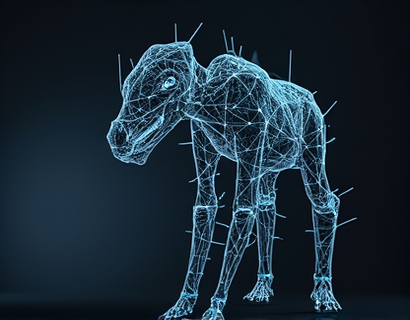Decentralized Authentication: Elevating Business Security and Streamlining Access with Advanced Solutions
In the digital age, the importance of robust security measures cannot be overstated. As businesses increasingly rely on digital platforms to conduct operations, the need for advanced identity management solutions has become paramount. Decentralized authentication stands out as a transformative approach, offering enhanced security and streamlined access control. This method leverages blockchain technology and distributed networks to manage user identities, providing a more secure and efficient alternative to traditional centralized systems.
Decentralized authentication solutions are designed to address the vulnerabilities inherent in centralized identity management systems. In a centralized model, a single point of failure can compromise the entire system, making it an attractive target for cybercriminals. By contrast, decentralized authentication distributes identity data across a network of nodes, eliminating the risk of a single breach affecting the entire system. This distributed approach not only enhances security but also ensures higher availability and resilience.
Key Benefits of Decentralized Authentication
The adoption of decentralized authentication brings numerous advantages to businesses. Firstly, it significantly improves security by reducing the risk of data breaches. Since identity information is stored across multiple nodes, there is no single point of attack. Even if one node is compromised, the overall system remains secure due to the redundancy and encryption mechanisms in place.
Another significant benefit is the enhancement of user experience. Decentralized authentication systems can provide seamless and frictionless access to resources, eliminating the need for multiple passwords and complex login processes. Users can authenticate once and gain access to multiple services, reducing the burden of managing multiple credentials.
Moreover, decentralized authentication solutions offer greater control and transparency. Users have more sovereignty over their personal data, as they can manage and share their identity information selectively. This empowerment fosters trust between businesses and their users, which is crucial in today's data-conscious environment.
Technological Foundations of Decentralized Authentication
The backbone of decentralized authentication lies in blockchain technology and distributed ledger systems. Blockchain's inherent properties, such as immutability and transparency, make it an ideal platform for secure identity management. Each user's identity is represented as a unique digital signature, stored in a blockchain network. This digital signature is created using cryptographic algorithms, ensuring that the data is both secure and verifiable.
Smart contracts play a crucial role in automating and enforcing authentication processes. These self-executing contracts with the terms directly written into code can automate user verification and access control without the need for intermediaries. This automation not only speeds up the authentication process but also reduces the risk of human error and fraud.
Implementing Decentralized Authentication in Businesses
For businesses looking to adopt decentralized authentication, the process involves several key steps. First, organizations need to assess their current identity management infrastructure and identify areas where decentralized solutions can provide the most value. This assessment should consider factors such as the types of data being managed, the number of users, and the existing security protocols.
Once the assessment is complete, businesses can select a suitable decentralized authentication platform. There are various open-source and commercial solutions available, each with its own set of features and capabilities. Popular platforms include Self-Sovereign Identity (SSI) frameworks and blockchain-based identity management systems. It's essential to choose a solution that aligns with the organization's specific needs and technical capabilities.
After selecting the platform, the next step is to integrate it into the existing IT infrastructure. This integration may involve developing custom applications or modifying existing ones to interact with the decentralized authentication system. Developers need to ensure that the system supports secure communication protocols and that user data is encrypted both in transit and at rest.
Case Studies and Real-World Applications
Several organizations have successfully implemented decentralized authentication solutions, demonstrating their practical benefits. For instance, a financial institution adopted a blockchain-based identity management system to enhance the security of its online banking platform. By using decentralized authentication, the institution reduced the risk of fraud and improved the customer experience by simplifying the login process.
Another example is a healthcare provider that implemented a decentralized solution to manage patient records and access permissions. The system allowed patients to control who could access their medical information, ensuring compliance with data protection regulations while streamlining access for authorized personnel. This approach not only enhanced security but also improved operational efficiency.
Challenges and Considerations
While the benefits of decentralized authentication are clear, there are also challenges and considerations that businesses must address. One of the primary challenges is the technical complexity involved in implementing and maintaining a decentralized system. Organizations need to invest in skilled personnel or partner with experts who can guide the implementation process.
Interoperability is another critical factor. For decentralized authentication to be effective, different systems and platforms need to work seamlessly together. This requires adherence to industry standards and protocols, ensuring that identity information can be shared and verified across various environments.
Regulatory compliance is also a significant consideration. As data protection laws such as GDPR and CCPA become more stringent, businesses must ensure that their decentralized authentication solutions comply with these regulations. This includes implementing robust data governance practices and providing users with clear control over their personal information.
Future Trends in Decentralized Authentication
The landscape of decentralized authentication is rapidly evolving, with several emerging trends poised to shape the future of identity management. One such trend is the integration of decentralized authentication with the Internet of Things (IoT). As more devices connect to the internet, secure and scalable identity management solutions will be essential to protect the vast amount of data generated by these devices.
Another trend is the adoption of zero-knowledge proofs, a cryptographic method that allows one party to prove to another that a statement is true without revealing any information beyond the statement itself. This technology can enhance privacy and security in decentralized authentication systems, enabling users to verify their identity without exposing sensitive data.
Furthermore, the rise of decentralized finance (DeFi) and non-fungible tokens (NFTs) is driving demand for more sophisticated identity verification methods. Decentralized authentication solutions that can seamlessly integrate with these emerging technologies will be in high demand, offering new opportunities for businesses to innovate and differentiate themselves.
Conclusion
Decentralized authentication represents a significant leap forward in business security and efficiency. By leveraging blockchain technology and distributed networks, organizations can create more secure, resilient, and user-friendly identity management systems. While the transition to decentralized solutions presents challenges, the long-term benefits in terms of enhanced security, improved user experience, and greater control over personal data make it a compelling choice for modern enterprises. As the technology continues to mature, businesses that embrace decentralized authentication will be better positioned to thrive in an increasingly digital and interconnected world.











































